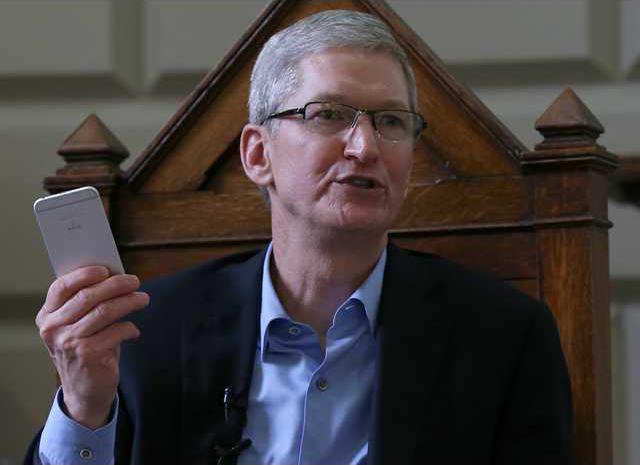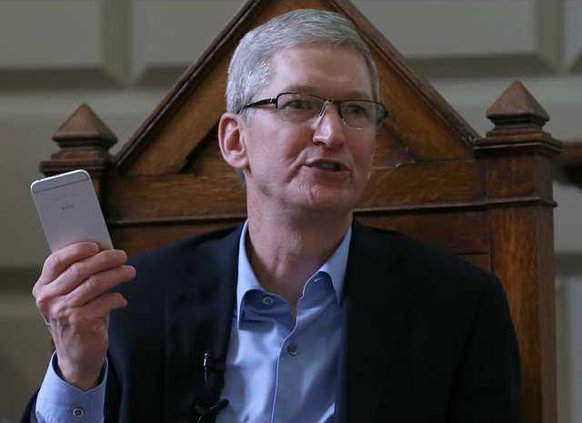Executives from Facebook and Apple exchanged a word war this week over data security.
The confrontation began when Apple CEO Tim Cook told Recode he never would have allowed peoples data to be breached the way Facebook did over the last two years.
Cooks comments specifically referenced the data breach involving Facebook and Cambridge Analytica, a data firm that improperly bought Facebook user data from a third party.
The truth is, we could make a ton of money if we monetized our customer if our customer was our product. Weve elected not to do that, Cook said.
Cook said Apple sells products, which he feels is a healthier business model to keep customers happy.
Facebook founder Mark Zuckerberg struck back at Cooks comments in an interview with Vox.
You know, I find that argument, that if youre not paying that somehow we cant care about you, to be extremely glib and not at all aligned with the truth, he said.
Zuckerberg said Facebook remains a free product, so advertising is the only way the company can make money.
Having a free product, he said, makes Facebook unique.
I thought Jeff Bezos had an excellent saying on this in one of his Kindle launches a number of years back, Zuckerberg said. He said, There are companies that work hard to charge you more, and there are companies that work hard to charge you less. And at Facebook, we are squarely in the camp of the companies that work hard to charge you less and provide a free service that everyone can use. I dont think at all that that means that we dont care about people.
Zuckerberg added, "I think its important that we dont all get Stockholm Syndrome and let the companies that work hard to charge you more convince you that they actually care more about you."
According to Mashable, Cook has had the final laugh in the ongoing dispute since Facebooks stock has dropped $40 billion in market value over the breach.
Cook previously spoke out against Facebook on March 23 at the China Development Forum in Beijing just after reports came out about Facebooks data breach, according to Bloomberg.
"I think that this certain situation is so dire and has become so large that probably some well-crafted regulation is necessary," he said. "The ability of anyone to know what you've been browsing about for years, who your contacts are, who their contacts are, things you like and dislike and every intimate detail of your life from my own point of view it shouldn't exist."
Meanwhile, Zuckerberg said he hopes to make Facebook a little more democratic and give its members a chance to make their own decisions about what they trust on Facebook, BBC News reported.
He said he hoped to create an independent entity much like the Supreme Court, with impartial hires, who could make the final decisions when it comes to whats appropriate to have on Facebook.
The confrontation began when Apple CEO Tim Cook told Recode he never would have allowed peoples data to be breached the way Facebook did over the last two years.
Cooks comments specifically referenced the data breach involving Facebook and Cambridge Analytica, a data firm that improperly bought Facebook user data from a third party.
The truth is, we could make a ton of money if we monetized our customer if our customer was our product. Weve elected not to do that, Cook said.
Cook said Apple sells products, which he feels is a healthier business model to keep customers happy.
Facebook founder Mark Zuckerberg struck back at Cooks comments in an interview with Vox.
You know, I find that argument, that if youre not paying that somehow we cant care about you, to be extremely glib and not at all aligned with the truth, he said.
Zuckerberg said Facebook remains a free product, so advertising is the only way the company can make money.
Having a free product, he said, makes Facebook unique.
I thought Jeff Bezos had an excellent saying on this in one of his Kindle launches a number of years back, Zuckerberg said. He said, There are companies that work hard to charge you more, and there are companies that work hard to charge you less. And at Facebook, we are squarely in the camp of the companies that work hard to charge you less and provide a free service that everyone can use. I dont think at all that that means that we dont care about people.
Zuckerberg added, "I think its important that we dont all get Stockholm Syndrome and let the companies that work hard to charge you more convince you that they actually care more about you."
According to Mashable, Cook has had the final laugh in the ongoing dispute since Facebooks stock has dropped $40 billion in market value over the breach.
Cook previously spoke out against Facebook on March 23 at the China Development Forum in Beijing just after reports came out about Facebooks data breach, according to Bloomberg.
"I think that this certain situation is so dire and has become so large that probably some well-crafted regulation is necessary," he said. "The ability of anyone to know what you've been browsing about for years, who your contacts are, who their contacts are, things you like and dislike and every intimate detail of your life from my own point of view it shouldn't exist."
Meanwhile, Zuckerberg said he hopes to make Facebook a little more democratic and give its members a chance to make their own decisions about what they trust on Facebook, BBC News reported.
He said he hoped to create an independent entity much like the Supreme Court, with impartial hires, who could make the final decisions when it comes to whats appropriate to have on Facebook.








